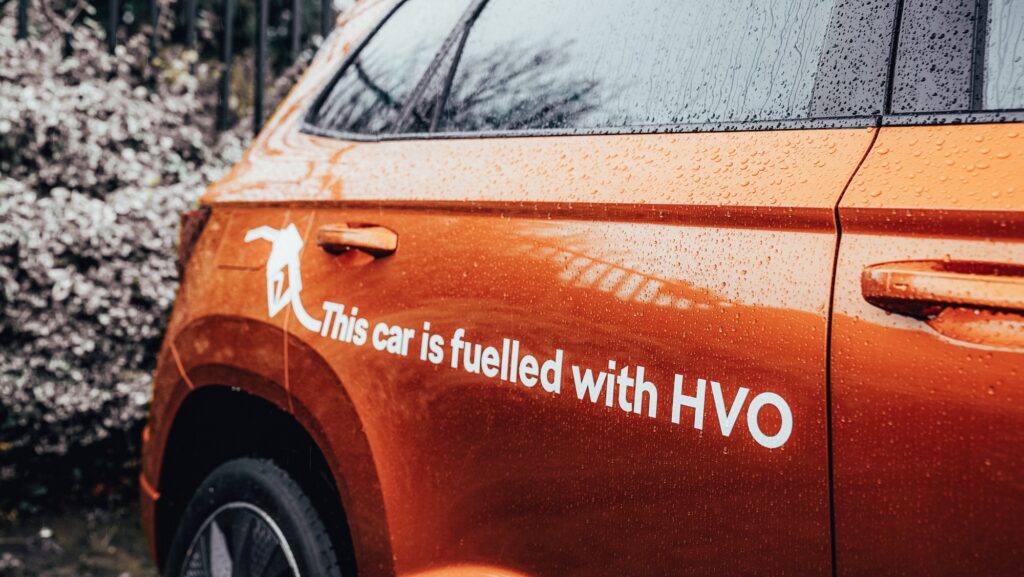Recently we attended a talk on the low-emission biofuel HVO. Hydrotreated vegetable oil, or HVO, is a renewable and low-carbon fuel that can replace diesel in vehicles without any engine modifications.
We were given a normal Skoda vehicle for a quick test drive that was running on HVO and attended a talk afterwards discussing the availability and carbon savings of HVO. During the demonstration we didn’t see any of the refining process, the contents of what made up the fuel nor the fueling of the vehicle which was used during the test drive. We purely received information from a seller of HVO in Ireland, Certa and Skoda Ireland who are currently using HVO in some of their own fleet.

We met with Laura Byrne – head of sustainable fuels at Certa and John Donegan,Brand Director at Škoda Ireland to hear how about the availability of HVO and how Skoda plans to support the use of HVO in their vehicles.
Certa, one of the leading HVO providers in Ireland, say that the use of HVO alongside regular diesel fuel can reduce carbon footprints by up to 90%.

HVO is made from waste vegetable oils and fats that are treated with hydrogen to remove impurities and oxygen. Unlike conventional biodiesel, HVO does not contain any fossil or animal-derived components, and has a longer shelf life and better cold performance. HVO meets the international fuel standard EN 15940 and the Fuel Quality Directive 2009/30/EC Annex II, and is approved by several original equipment manufacturers (OEMs).

Skoda is one of the first car brands in Ireland to promote HVO. Skoda currently have an offer running where customers who purchase a new diesel Skoda between March 1 and March 31, 2024, can receive a HVO fuel voucher worth up to €500, depending on the model. HVO is currently available at selected Certa fuel stations in Dublin, Trim and Cork, and will be more widely distributed throughout the year.

By switching to HVO, consumers should have the same performance and economy as diesel, while significantly reducing their greenhouse gas emissions and environmental impact.
HVO, or hydrotreated vegetable oil, is a renewable and low-carbon fuel that can replace diesel in most vehicles and machinery. Some of the benefits of HVO over diesel are:
HVO is a more sustainable alternative to diesel that can help reduce the carbon footprint and environmental impact of various industries and applications.
HVO reduces greenhouse gas emissions by up to 90% compared to diesel, as it is made from waste vegetable oils and fats that would otherwise be discarded or burned.
HVO improves air quality and human health by producing less particulate matter, nitrogen oxides, and sulphur oxides than diesel, which are harmful pollutants that cause respiratory and cardiovascular diseases.
HVO is more stable and compatible than diesel, as it has a longer shelf life, better cold performance, and higher cetane number. HVO does not require any engine modifications or additional infrastructure, and can be blended with diesel at any ratio.
HVO is biodegradable and non-toxic, which means it has a lower environmental impact in case of spills or leaks. HVO also has a higher flash point than diesel, which makes it safer to store and transport.
However, it also has some disadvantages, such as:
Switching to HVO in your car or machinery is easy, as HVO is a drop-in alternative to diesel that does not require any engine modifications or additional infrastructure.
You can use HVO in any vehicle or equipment that is designed for standard diesel, without any changes to the engine or fuel system. You can also mix HVO with diesel at any ratio, or use it as a pure fuel.
You do not need to drain, flush, or clean out your tank before using HVO, as it is compatible with existing diesel tanks and pumps.
There are many things you need to consider before switching to HVO. HVO is not widely available in all markets and regions, as it depends on the supply of waste vegetable oils and fats. You may have to rely on specific distributors or stations to access HVO, which may limit your flexibility and convenience. HVO is also more expensive than regular diesel, as it requires more processing and refining. The price difference may vary depending on the availability and demand of HVO and diesel. But you can switch between running HVO and regular diesel without issue.
If you want to switch to HVO in your car or machinery, you can contact local HVO supplier or distributor to find out the nearest HVO station or delivery service. You can also check the certification and specification of the HVO fuel to ensure it meets the international standards and the approval of your vehicle or equipment manufacturer.
While it looks to be beneficial for commercial users hitting emissions targets, is the benefit to individuals as clear cut?
